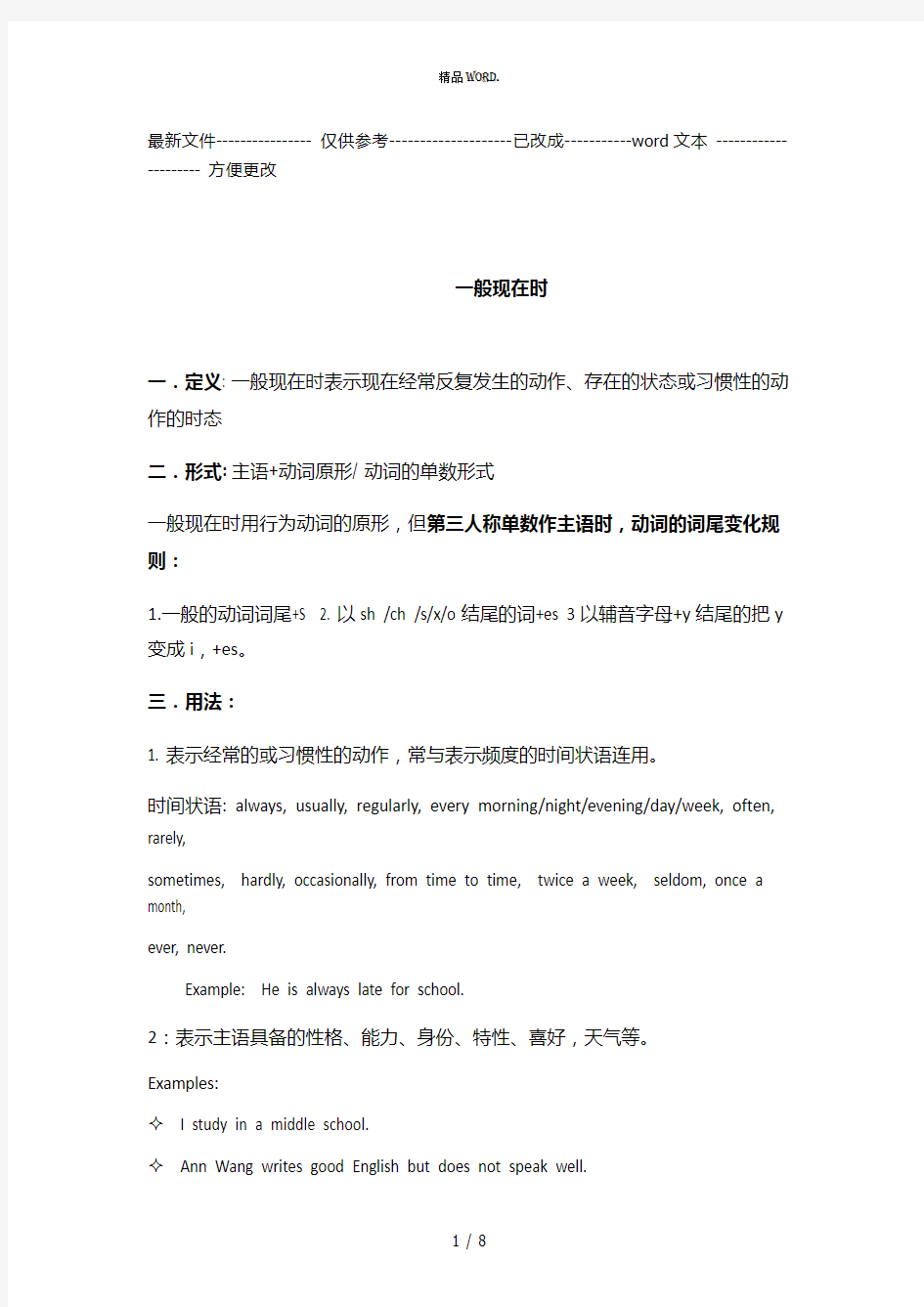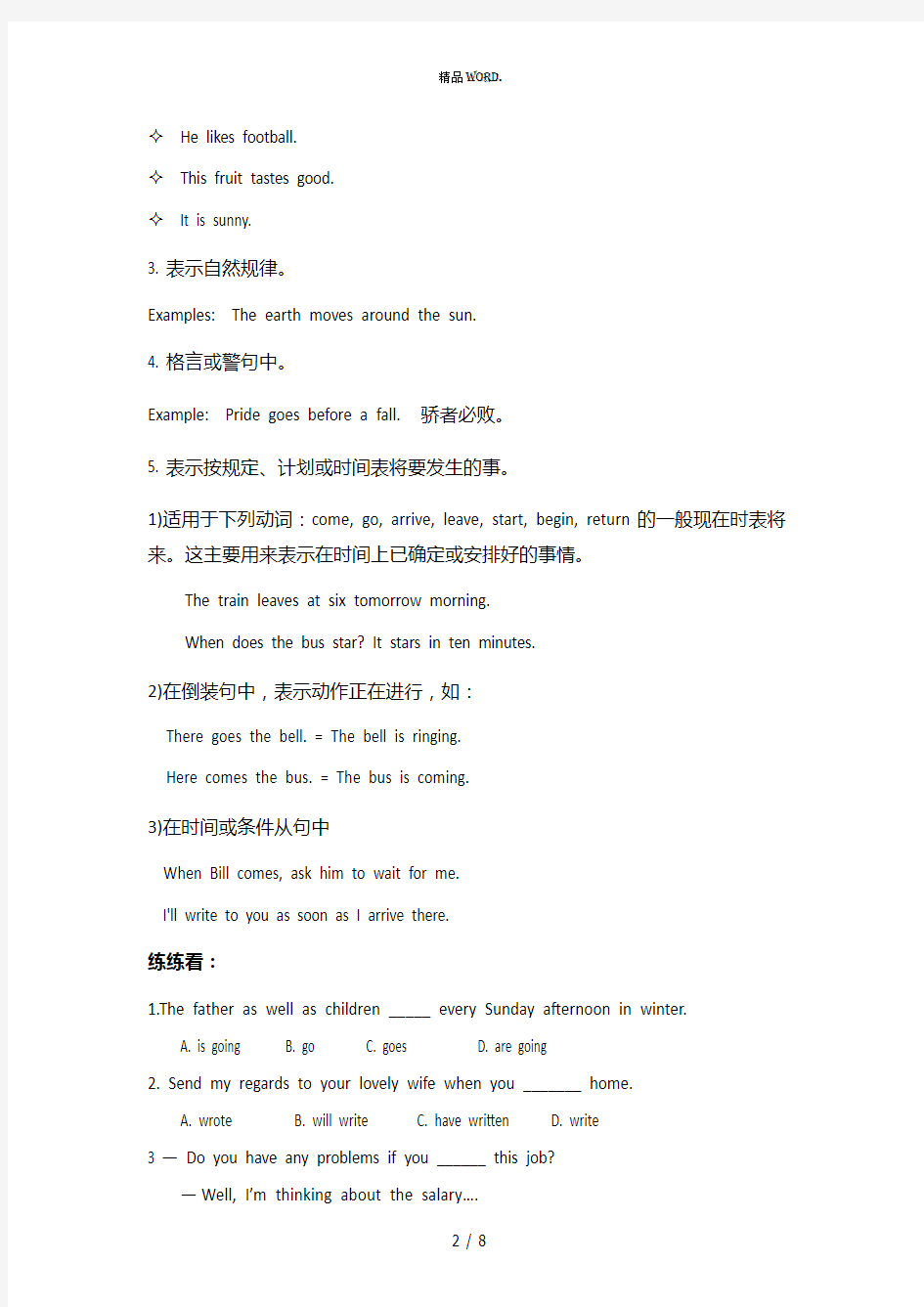高中英语一般现在时高考试题集锦11(优选.)


最新文件---------------- 仅供参考--------------------已改成-----------word文本 --------------------- 方便更改
一般现在时
一.定义: 一般现在时表示现在经常反复发生的动作、存在的状态或习惯性的动作的时态
二.形式:主语+动词原形/ 动词的单数形式
一般现在时用行为动词的原形,但第三人称单数作主语时,动词的词尾变化规则:
1.一般的动词词尾+S
2. 以sh /ch /s/x/o结尾的词+es 3以辅音字母+y结尾的把y 变成i,+es。
三.用法:
1. 表示经常的或习惯性的动作,常与表示频度的时间状语连用。
时间状语: always, usually, regularly, every morning/night/evening/day/week, often, rarely,
sometimes, hardly, occasionally, from time to time, twice a week, seldom, once a month,
ever, never.
Example: He is always late for school.
2:表示主语具备的性格、能力、身份、特性、喜好,天气等。
Examples:
?I study in a middle school.
?Ann Wang writes good English but does not speak well.
?He likes football.
?This fruit tastes good.
?It is sunny.
3. 表示自然规律。
Examples: The earth moves around the sun.
4. 格言或警句中。
Example: Pride goes before a fall.骄者必败。
5. 表示按规定、计划或时间表将要发生的事。
1)适用于下列动词:come, go, arrive, leave, start, begin, return的一般现在时表将来。这主要用来表示在时间上已确定或安排好的事情。
The train leaves at six tomorrow morning.
When does the bus star? It stars in ten minutes.
2)在倒装句中,表示动作正在进行,如:
There goes the bell. = The bell is ringing.
Here comes the bus. = The bus is coming.
3)在时间或条件从句中
When Bill comes, ask him to wait for me.
I'll write to you as soon as I arrive there.
练练看:
1.The father as well as children _____ every Sunday afternoon in winter.
A. is going
B. go
C. goes
D. are going
2. Send my regards to your lovely wife when you _______ home.
A. wrote
B. will write
C. have written
D. write
3 — Do you have any problems if you ______ this job?
—Well, I’m thinking about the salary….
A. offer
B. will offer
C. are offered
D. will be offered
4. I think it is necessary for my 19-year-old son to have his own mobile phone, for I sometimes want to make sure if he _____ home for dinner.
A. come
B. comes
C. has come
D. will come
5. According to the time-table, the train for Shanghai _____ at 7 o’clock in the evening.
A. leaves
B. has left
C. was left
D. will leave
6. Look at the timetable. Hurry up! Flight 4026 ____ off at 18:20.
A. takes
B. took
C. will be taken
D. has taken
7. Galileo collected facts that proved the earth _____ around the sun.
A. moved
B. moves
C. has moved
D. had moved
8. ——Can I help you, sir? ——Yes, I bought this radio yesterday, but it ____.
A. didn’t work
B. won’t work
C. can’t work
D. doesn’t work
9 This machine _______. It hasn’t worked for years.
A. didn’ t work
B. wasn’ t working
C. doesn’ t work
D. isn’ t working
10. The house belongs to my aunt but she______ here any more.
A. hasn't lived
B. didn't live
C. hadn't lived
D. doesn't live
11. Every few years, the coal workers their lungs X-rayed to ensure their health.
A. are having
B. have
C. have had
D. had had
12. Barbara is easy to recognize as she’s the only one of the women who
_____evening dress.
A. wear
B. wears
C. has worn
D. have worn
13. The palace caught fire three times in the last century, and little of the original
building
____now.
A. remains
B. is remained
C. is remaining
D. has been remained
14. The wet weather will continue tomorrow, when a cold front _____ to arrive.
A. is expected
B. is expecting
C. expects
D. will be expected
15. --- Have you seen my e-mail about our TESL, project?
--- Yes. Luckily, I checked my e-mails yesterday. Normally, I ____ my e-mail-box for days.
A.haven’t opened B.didn’t open C.hadn’t opened D.don’t open
16. He will come to see you the moment he ______his work.
A. will finish
B. finishes
C. would finish
D. had finished
17. If their marketing plans succeed,they ____ their sales by 20 percent.
A. will increase
B. have been increasing
C. have increased
D. would be increasing
18. —Shall I call at your house at seven o’clock tomorrow evening?
—I ______ a walk in the park. So you won’t find me at home then.
A. shall be taking
B. shall take
C. will take
D. am taking
19. --- Let’s discuss the question raised last night, shall we?
--- There is no hurry for that. I ____ for a conference.
A. headed
B. was heading
C. am heading
D. have headed
20. Once education is made free,many children who have dropped out of
school ____ .
A. will come back
B. came back
C. have come back
D. had come back
1-5 CDCDA 6-10 ABDCD 11-15 BBAAD 16-20 BAACA
现在进行时
现在进行时的构成:
现在进行时由"be+v-ing"构成。be应为助动词 v-ing为现在分词形式:
现在分词形式变化形式:
(1)一般情况下直接加 think---thinking sleep---sleeping study---studying speak---speaking
(2)以不发音的字母e结尾的单词,去掉字母e,再加 ing
wake---waking make---making come---coming take---taking leave---leaving have---having
(3)以ie结尾的动词,把ie改为y ,再加ing die---dying lie---lying
(4)以重读闭音节结尾,呈现“辅,元,辅”结构的动词,先双写末尾的辅音字母,再加ing stop---stopping sit---sitting run---running forget---forgetting begin---beginning
注:以重读闭音节结尾,呈现“辅,元,辅”结构的动词,先双写末尾的辅音字母,再加ing 。
这类词有:begin,cut, get, hit, run, set, , spit, stop, swim, beg, drop, fit, nod, dig, forget, regret, rid, 等。travel虽然重读第一音节,词尾音节不重读,但是现在分词仍要双写末尾辅音字母,然后再加ing
如:travel---travelling.
现在进行时的用法:
1.现在进行时可以表示说话时正在发生的动作,常和now,right now,at this moment等时间状语及动词look,listen等连用,现在进行时的“暂时性”特征。如: I 'm sitting on a rock near the river with my friends.Our guide is cookin g supper.
例:(1. Look at the children over there.What __________ ?
A.do they do B.are they doing C.they are doing D.is he doing
(2. I don 't really work here; I __________ until the new secretary arrives .
A.just help out B.have just helped out C.am just helping out D.will just help out
2.现在进行时可以表示目前一段时间内一直在发生的动作,但是说话时不一定发生,常和 these days ,this week,at present等时间状语连用,这是现在进行时的“阶段性”特征。如:
We are enjoying our boat trip very much.(这几天)我们坐船旅游非常高兴。
We are having a wonderful time .我们(这几天)玩得很开心。
例:Is this raincoat yours ?
—No,mine __there behind the door . A.is hanging B.has hung C.hang s D.hung
3.现在进行时可以表示现在不断发展变化的事情。如:
It's late Autumn.The weather is getting colder and colder .现在是深秋了,天气变得越来越冷。
Selecting a mobile phone for personal use is no easy task because technology __________ so rapidly .
A.is changing B.has changed C.will have changed D.will change 4.现在进行时态表示将来
现在进行时态可用来表示一个在最近按计划或打算要进行的动作;表示将来意义的现在进行时态由句中表示将来时间的词语或上下文表
明。 Betty is leaving for Guangzhou by plane tomorrow. Bob is going to the airp ort by taxi next week.
I’m seeing the dentist this afternoon. Are they staying here for long?
am/is/are +v.-ing形式与表示将来的时间状语连用,可以表示按照计划或安排在不久的将来将要发生的动作,含义是“打算要做”。能用于进行时态表将来的动词常常是瞬间动词,位移动词或去向动词(并非所有动词),
如:go, come, leave, start ,arrive ,reach,sleep, stay, play, do, have, take, get to, see of f,
When are you going off to Guangzhou? How are you getting to the airport ?
例: I ' ve won a two-day holiday to Florida.I __________ my mum.
A. am taking B.have taken C.take D.will have taken
5. 现在进行时代替一般现在时,表示反复性或习惯性的动作,常与副词
always, continually,forever, constantly等连用,表示说话人的赞扬,厌恶,不满,遗憾等的感情色彩。
He is always thinking of others first. You are constantly complaining.
He is always talking big. He is always making the same mistakes
现在进行时练习一.写出下列动词的现在分词
stand_________ swim_________ play__________ watch________
skate _________ run__________ sleep_________ jump_________
walk_________ ride__________ clean_________ make________
wash_________ do____________ go__________ listen_________
play __________ come_________ sing__________ have_________
write________ dance_________ sit___________ read_________
二.用括号中动词的适当形式填空:
1. My parents _______________(watch)TV now.
2. Look. Three boys _______________(run).
3. What _______________ your mother _______________(do)now?
4. ___________ your dog ___________ now?(sleep)
5. ___________ you ___________(listen)to music? Yes, I am.
6. Look, Miss Chen _______________ football.(play)
7. Tom and his sister _______________(wait)for you over there.
8. Now Class 3 and Class 4_______________(have) a test.
9. Listen, someone _______________(sing)in the classroom.
10. ——Where is Zhang Yan?
——She _______________(talk)with her teacher in the teacher’s office.
最新文件---------------- 仅供参考--------------------已改成-----------word文本 --------------------- 方便更改
赠人玫瑰,手留余香。
